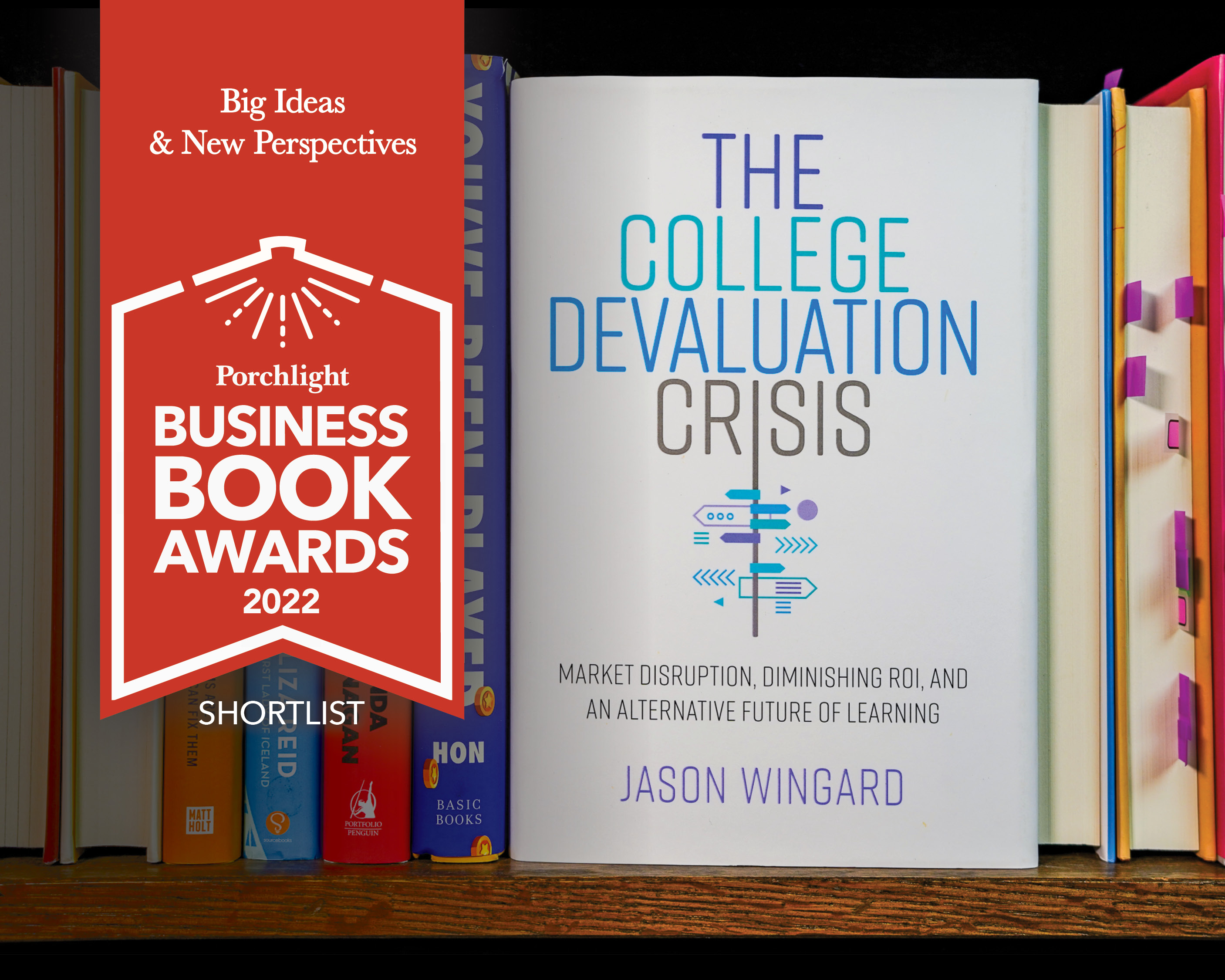The College Devaluation Crisis | An Excerpt from the 2022 Porchlight Big Ideas & New Perspectives Book of the Year
The latest addition to our editorial team, Jasmine Gonzalez, was in charge of curating the Big Ideas & New Perspectives category for us this year. And, as she recently wrote, one book really grabbed her attention:
I picked up The College Devaluation Crisis by Jason Wingard on a Friday afternoon after hours of poring over a stack of other category contenders. Since the workday was ending, I read the introduction and made a note to myself on a bookmark that I was intrigued and would revisit the book later. Leaving this book at the office turned out to be a mistake. I spent that weekend with a feeling like a mosquito bite, a persistent itch that begged to be scratched: I couldn’t explain it, but I needed to keep reading this book. When I finally returned to it a few days later, I finished it in one sitting—not because it’s a fast-paced read (although it is) but because I was enthralled by the visions of a radically changed society that Wingard laid out.
As you’ll see in the following excerpt, Wingard believes wholeheartedly in higher education. As a university president, he no doubt would benefit most from a status quo in which college is the default path for everyone. Instead, he uses his position as an academic to research and present alternatives that work for people across a greater span of circumstances and experiences. There is no one-size-fits-all solution when it comes to education, and that is a good thing. It’s rare to come across an idea so big that it could change the very fabric of our society—and yet, this is what The College Devaluation Crisis delivers.

I am a fourth-generation descendant of slaves—slaves who toiled in the fields of Wingard Plantation in Wingard, Alabama—and I am the child of a family dedicated to, and beneficiaries of, education and professional development.
Although my paternal grandparents had only fourth- and eighth-grade educations, respectively, they nevertheless managed to instill in the minds of their six children the value of education. They saw it as a way that African-American families—all families—could rise up out of slavery, or poverty, or a systemic lack of access to benefits. For them, the very “saving” of America rested on getting an education, and they embodied the value of education as a prioritized and imminent pursuit. Five of those children earned college degrees, five earned master’s degrees, and two, including my father, earned doctorates.
My father retired from a career in education with a final job as a public school superintendent. My mother retired from her position as head of human resources in the insurance industry. My sister earned her doctorate in English and is currently a college professor. I hold four academic degrees; my wife has two.
My extended family of aunts, uncles, and cousins holds jobs ranging from Wall Street executives and CEOs to college deans and prison wardens to judges and lawyers to colonels and entrepreneurs to physicians, nurses, and engineers.
Education degrees, in short, run rampant in my family.
My own twenty-five-year (as of 2021) professional career has focused on the education ecosystem—corporate, nonprofit, higher education, and K–12.The educational degrees I have received were granted from Stanford, Emory, Harvard, and the University of Pennsylvania, while a selected sample of my job descriptions represent the aforementioned ecosystem diversity: president at Temple; dean at Columbia; chief learning officer at Goldman Sachs; vice dean at Wharton; executive director at Stanford; senior fellow at the Aspen Institute, and senior vice president at ePals and CEO of the ePals Foundation.
I value education. I have seen how it has advanced my family, and so many other families, and I am aware of the benefits it has brought to my own career. To me, education is the best mechanism for inspiring talent, the best tool for measuring learning and achievement, the best foundational access to thought leadership at the highest level.
Three of my children are currently pursuing Columbia degrees. My wife and I certainly hope our other two children also attend college and earn degrees—to continue the legacy of opportunity for upward mobility that the degree has proven to be for our family over the last hundred years. To me, it remains an enabler of success and the basis of an individual’s ability to rise to his or her rightful place in society and to a personally fulfilling life.
I first started to pay attention to the economic value of the degree in the summer of 2017. As a dean at Columbia, I oversaw not just a graduate school featuring sixteen master of science degrees, but also Columbia University’s programs for high school students. That summer, I noticed a dramatic shift in the number of top employers recruiting directly from the pool of high school students in the summer program—and away from the pool of students in the undergraduate and graduate programs.
Something was up. The world’s top companies recruiting directly from high schools for professional roles previously reserved for college graduates? What was going on? Did these young students know enough? What was the angle?
When I looked into it, the rationale I heard from the employers was that placement and performance data at the company level showed declining levels of job readiness and hiring satisfaction from college and graduate school hires. As a result, the hiring companies had to invest resources to train their newly trained college graduates in the skills needed to do the work. Since the college degree had ceased to be a guarantee that employers were going to get what they needed, why not hire younger and cheaper—right out of high school? Invest the time and money, instead, to train high school graduates and gain the likely benefit of retaining them longer.
I then embarked on a couple of years’ worth of interviewing among recent college graduates at Columbia and around the country to try to learn how, in their eyes, their formal education had prepared them for their jobs. I also interviewed as many, if not more, employers on the same topic, with a special emphasis on interviews with senior leaders on-site at Fortune 500 companies. I held focus groups with lay people about their thoughts on the topic and about any experience with similar outcomes.
Overall, my research revealed that most Americans still believe a college degree is a pathway to professional success, and that most professional employ-ers still selectively hire from colleges and universities for their junior talent. The value of the college degree still outpaces all other forms of professional preparation. But my research definitely leads me to believe that the sonic boom has been heard, and that a seismic shift is under way. The value of the college degree, in my estimation, has reached its peak and is on the wane, thanks to a host of factors stretching from cost and affordability to curriculum relevance to rapidly evolving skill needs to advances in automation and technology—and including the disruption in the workforce due to the COVID-19 pandemic.
As president of Temple University, and professor of human resource development and organizational leadership, I aggressively challenge students, faculty, employers, and policymakers to proactively and continually scan the marketplace, plan scenarios, and predetermine changes in job contexts and market dynamics. By my own advice, it looks to me like the industry in which I work is at risk. Higher education is under fire. Higher education is losing its value. As of this writing, we may still be “winning,” but I don’t see the winning as permanent. Some educational institutions are, in fact, currently losing to the point of extinction, while alternative organizations to college are capturing more and more competitive market share. Why is that? How is it happening? What actions can reverse the new trends? Will the next generation of students be predestined for college, or does the future suggest another route to skilled readiness? Will higher education pivot and adapt to resume supreme relevance, or will it resist change and be replaced? These are questions for Temple. These are questions for our global industry peers.
In this book, I explore the plight in which the college degree now finds itself. I bring to this examination what I’ve learned through research, executive and operational management, leadership training, and executive coaching—all needed, I believe, to examine the complexities of both the current context and the likely future of learning. People have asked how, as a university president and professor, I can write a book that questions the value of the product I “sell”; how can I support my day job while profiling, or even championing, the successes of competitive alternatives?
Well, Readers and Friends, that is academic scholarship—and may the best solution win!
Dr. Jason Wingard
Philadelphia
October 11, 2021
From The College Devaluation Crisis by Jason Wingard. Copyright © 2022 by Jason Wingard.
Reprinted by permission of Stanford University Press.
ABOUT THE AUTHOR
Dr. Jason Wingard is President of Temple University, Professor of Management, and Professor of Policy, Organizational, and Leadership Studies. He is also Chairman of The Education Board, Inc., a boutique management consulting firm specializing in executive coaching and advisory services. Previously, Dr. Wingard served as Dean of Columbia University's School of Professional Studies; Chief Learning Officer of Goldman Sachs; and Vice Dean of the Wharton School, University of Pennsylvania.



